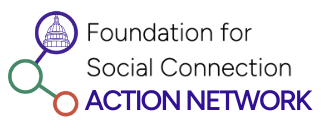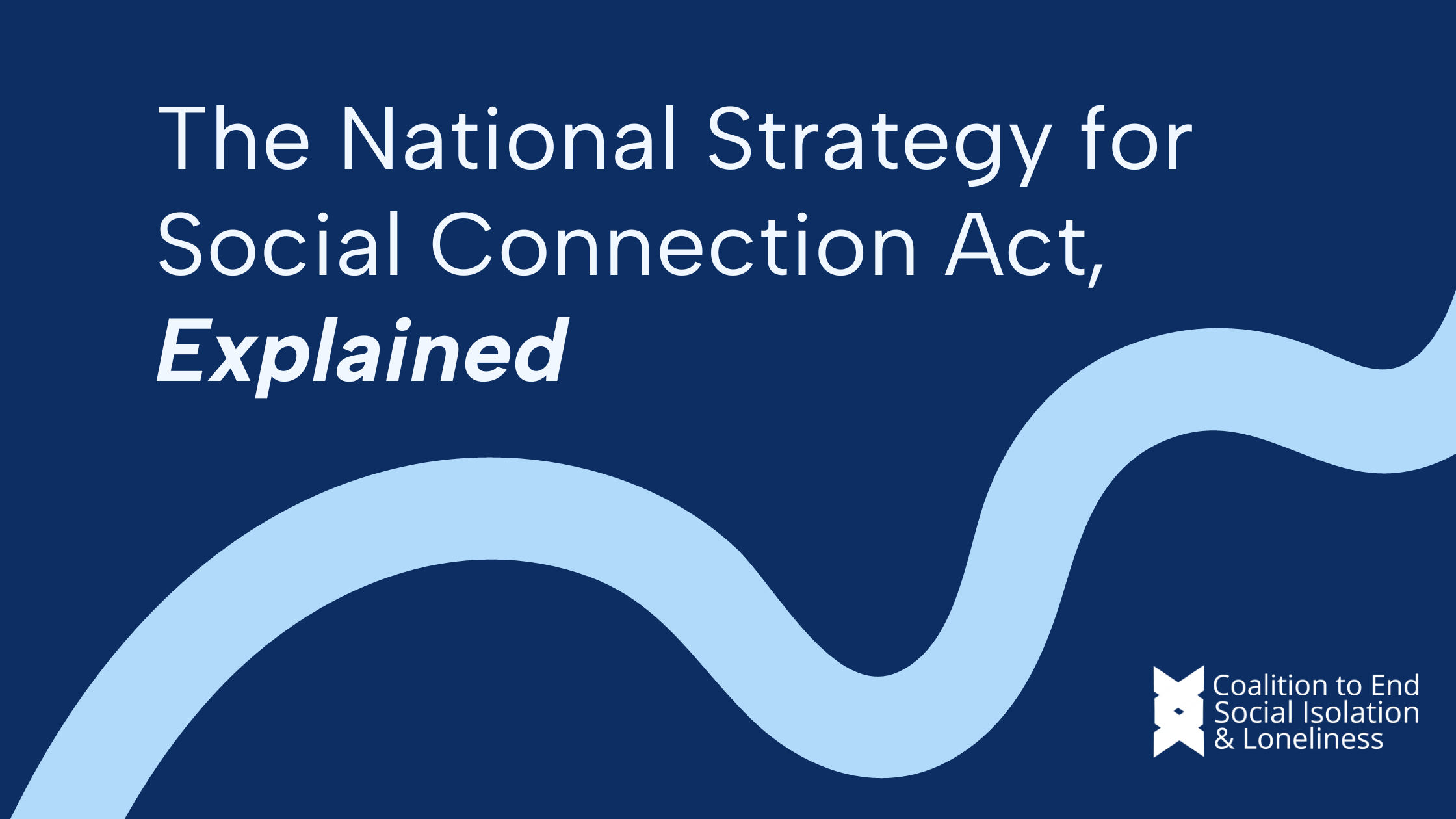What is the National Strategy for Social Connection (NSSC) Act?
In July, Senator Chris Murphy (D-CT) introduced the National Strategy for Social Connection Act. First previewed at the Coalition’s Connections at the Capitol national event, the legislation aims to address this country’s widespread and severely detrimental social isolation and loneliness issue – declared an epidemic by the U.S. Surgeon General in May. If implemented, it would mark the first-ever federal action toward developing a coordinated strategy to end social isolation and loneliness specifically.
Why is this legislation necessary?
Over 1 in 2 Americans (58%) report experiencing loneliness, with especially high rates among Gen Z (79%) and Millennials (71%). Based on a growing body of scientific evidence, reducing social isolation and loneliness and promoting social connection are critical to our health and welfare.
- Our Health: Social isolation and loneliness increase an individual’s risk of developing a host of physical, mental, and behavioral health issues like heart disease, diabetes, depression, dementia, Alzheimer’s, and even premature death.
- Our Economy: The U.S. spends an estimated $6.7 billion more on socially isolated Medicare beneficiaries compared to their more connected counterparts. Additionally, workers who experience loneliness report lower productivity as well as higher rates of absenteeism and intention to leave their company.
- Our Safety: Cities with greater social connection have a violent crime rate that is around 20% less than the average rate. Connected communities are also less likely to experience gun violence.
- Our Civic Engagement: People who lack personal trust – a side effect of loneliness – are more likely to distrust public institutions and government and believe that acting independently is better than working together. Community members who have better relationships with their local government are more likely to participate in community-building and work together to address local issues.
- Our Resiliency: Communities with strong social networks and higher levels of social capital are more equipped to handle natural disasters and coordinate emergency response plans.
What role does the government play in this issue?
Social isolation and loneliness are not individual problems but rather structural issues. Local leaders across the country have responded to this crisis with initiatives to foster social connection in their communities, but the scale of the issue and piecemeal progress necessitates a nationally coordinated, multi-agency strategy. We believe the federal government is responsible for establishing an environment that allows individuals and communities opportunities to flourish and thrive.
What would the proposal do?
This proposal takes a four-part approach to increase social connection for stronger communities. Most notably, it would create an Office of Social Connection Policy and Advisory Council within the executive branch to convene diverse groups of stakeholders for policy discussions and brief the President on our country’s current state of connection and recommended solutions. From these discussions and briefings, the Office would then devise a strategy that prioritizes social connection within governmental agencies and departments’ work, spanning all sectors of society (e.g., housing, health, education, labor, transportation, etc.). The Office would also build upon existing national health guidelines by providing Americans with evidence-based recommendations to address their experiences with social isolation and loneliness and help them feel more socially connected within their communities. Lastly, the proposal would allocate sustained funding to the Centers for Disease Control and Prevention (CDC) to expand our understanding of this issue, develop more effective and evidence-based policies, and improve our education and awareness efforts.
What does current support for this legislation look like?
The Coalition has been an outstanding supporter of this act since Senator Murphy first announced his intent to introduce it in June. (We are proud to say many of our 2023-2024 Policy Priorities have been incorporated within the legislation.) Other organizations like SMART Recovery and Coalition members Meals on Wheels America, Eventbrite, and For All Ages have also expressed their support.
In Congress, long-time champion of our work Senator Tina Smith (D-MN) has joined as a cosponsor of the bill; however, securing additional bicameral, bipartisan support is still underway. As a non-partisan official, the Surgeon General cannot issue endorsements. However, he has created an awareness campaign for his own Framework for a National Strategy to Advance Social Connection, which closely aligns with the legislation and may indirectly increase public support. Additionally, the Biden Administration has prioritized the promotion of social connection in its most recent plan to address our mental health crisis.
We hope support continues to grow as we continue our advocacy efforts. As a positive sign, our discussions with Congress members on both sides of the aisle point to a growing concern about our social isolation and loneliness epidemic and its negative implications on our individual and collective well-being.
What is next for the NSSC Act?
The Coalition’s primary goal is to attract additional bipartisan cosponsors. We have begun conversations with members of Congress on the Homeland Security and Government Affairs Committee, which is the committee of jurisdiction. As we continue our efforts to garner support for this bill, we are encouraged that our discussions have been very positive and look forward to working with members of Congress to create an Office of Social Connection Policy to develop and coordinate strategies to improve social infrastructure, quality of life, and community engagement for all Americans.
Download a PDF of this policy brief to share here.
To learn more about our 2023-2024 Policy Priorities, visit here.

